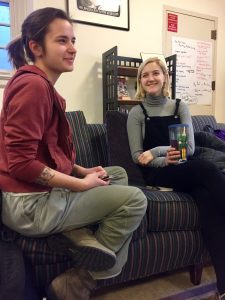Religion graces us with the tools to grapple with grief, loss, death, love, and connectedness. Religion is service: to oneself, to others, to duty. Religion is the recognition of a Universal network of love and justice. For some, religious community serves to remind us that our participation in faith is an active contribution to a greater “whole”. But what if we can’t find that community? Is our faith less active? Is our contribution less valuable?

Maeve Orlowski-Scherer ’21 and Gael Bemis ’20 at Interfaith Lunch
Maeve Orlowski-Scherer ’21 recounts her experience trying to find a religious community that fulfilled her: “I’ve always had a Catholic community at home…it’s been hard to find a religious community on campus that I resonate with”. While some people are solitary practitioners, others, like Maeve, consider having a religious community integral to their faith. After attending services at 3 different Christian churches in Northampton and the UMass Newman Center, Maeve realized she may have to move beyond her comfort zone. While she admits she’s still looking for advice on how to find her own community, she posits these words to people in search of religious belonging: “If you’re having a hard time finding a community outside of campus, it might be a good idea to expand beyond what’s comfortable. There are other places and people to share with.” Despite being Catholic, Maeve says that she’s found “the most spiritual connection” at religious events hosted by non-Catholic organizations; she recently attended both SCJC’s Hanukkah Party and Las Posadas, a Latin American Advent celebration. She also recommends Interfaith Lunch and Soup, Salad, and Soul, non-denominational, welcoming spaces which foster spiritual connection.
The community of faith that you find membership in may very well exist beyond the norm of your practice, outside of what’s familiar. Lydia Umhotlz ’21 echoes Maeve’s sentiments, expressing her openness to finding an interfaith community. For those who are seeking Interfaith interaction, the CRSL hosts an Interfaith Lunch on Tuesdays in the Chapel Sanctuary.* Lydia grew up with a strong Quaker background, attending youth retreats and a Quaker semester school to which she accredits a great deal of personal growth. For Lydia, religious community didn’t just realize her desire for shared faith. Her Quaker upbringing also developed her sense of strategic location: how she fit into community in a broader sense, as a young, Quaker woman. Lydia reminisces: “Quakers rely on a process of consensus and that has a unique way of building community…I miss that feeling.” The Northampton Friends Meeting is at 11 AM each Sunday. The Northampton Friends offer an open invitation to any members of the community seeking a shared worship space. Find their website here.
Unlike Maeve and Lydia, senior Maya Hayden actively chooses solitary spirituality over membership in a larger group. A Buddhist, Maya was raised by her mother, who practices Zazen. When asked if she feels having a spiritual community is critical to her practice, Maya responds “I think it’s really critical when I have time to dedicate to it. In college not as much, but in high school having a sangha was very important.”
For the spiritual among us, there is a marriage between religious learning and the thirst for greater understanding. They encourage and enforce one another. Whether or not you are active in or seeking a religious community, questioning how community plays a role in our individual practices is a great opportunity for religious learning.
*For more information about finding your religious community at Smith, and Interfaith Lunch, visit the website of the Center for Religious and Spiritual Life, here.
